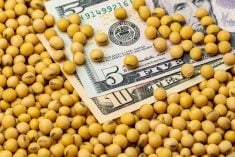Chicago | Reuters — Chicago Mercantile Exchange live cattle contracts on Tuesday reversed Monday’s losses, supported by short-covering and technical buying, said traders.
Funds that follow the Standard + Poor’s Goldman Sachs Commodity Index periodically sold, or “rolled,” August futures and simultaneously bought October on the second of five days of the Goldman Roll process.
August ended 1.05 cents/lb. higher at 114.875 cents (all figures US$). October closed 1.4 cents higher at 114.825 cents, and above the 20-day moving average of 114.013 cents.
Algorithm-type traders were behind Tuesday’s market gains in the absence of fundamental news, said Archer Financial Services broker Dennis Smith.
Read Also

U.S. grains: Soybeans retreat after rally, wheat holds at three-month high
U.S. soybean futures fell on Tuesday, retreating from a 16-month high hit a day earlier, as traders awaited Chinese purchases of U.S. cargoes following last week’s trade truce agreed by the world’s two largest economies.
Fundamental investors are tracking seasonally slumping wholesale beef values and adequate cattle supplies that market bears believe could weigh on some cash prices later this week.
Contrarians contend that fewer cattle for sale than last week in parts of the U.S. Plains and still impressive packer profits might help underpin cash returns.
A week ago most of the slaughter-ready, or cash, cattle in the U.S. Plains traded from $118 to $119/cwt.
Market participants await Wednesday’s Fed Cattle Exchange sale of 2,655 animals. Cattle there last week, on average, brought $117.75/cwt.
Fund buying and live cattle futures turnaround boosted CME feeder cattle contracts.
August feeders ended 2.575 cents/lb. higher at 147.25 cents.
Firmer front-month hog futures
Short-covering and CME lean hogs’ discounts to the exchange’s hog index for July 7 at 92.46 cents supported nearby futures contracts, said traders.
July, which will expire on July 17, ended up 0.675 cent/lb. to 92.15 cents. Most actively-traded August finished up 0.25 cent to 82.25 cents.
Investors sold deferred months and bought nearby contracts given the prospect of increased supplies during the second half of the year.
Cash hog prices and wholesale pork demand may peak around mid-July as more hogs come to market and high-heat scales back outdoor cook outs, said traders and analysts.
— Theopolis Waters reports on livestock markets for Reuters from Chicago.










